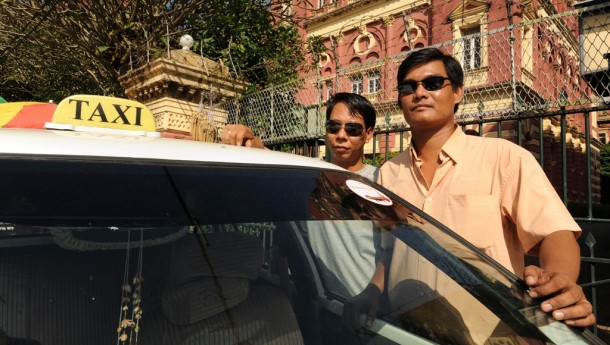After spending much of their lives behind bars, now they are spending their days behind the wheel. Founded by three former political prisoners, Golden Harp Taxi Network was created to provide job opportunities for released dissidents who were involved in Myanmar’s long democracy struggle.
With a logo of a traditional Myanmar harp on their windshields, the cabs have been plying the roads of Yangon since April, offering their services to both locals and foreigners.
“I couldn’t land a job since my release in 1999,” said U Bo Bo, one of the founders. The 42-year-old submitted nearly a dozen job applications but was turned down as soon as potential employers learned of his eight-year prison sentence.
Every month, members save a portion of their income to support comrades still in prison. “If they cannot find jobs upon their release, we can loan them money [from the fund] to pay a deposit for a taxi to join us,” explained U Shell, 43, another member of the network. Only in October did Golden Harp recruit its fourth sedan and driver.
From the outset, their services have been in demand, mostly from foreign visitors thanks to friends living abroad who pass on their contact details.
“We can make a living out of this job,” said U Bo Bo. “Hiring one of our taxis not only means that you are supporting an ex-political prisoner and his family, but also our comrades still in prison.”
U Shell said the job helps them reintegrate into society. There was a time when people were afraid of even talking to political prisoners because of their involvement in “subversive” activities.
“Now if my passengers learn who I am, they treat me with respect,” said U Shell. “When they learn about our network, they give us the thumbs up. Some give their numbers and say ‘Let me know if there’s something I can do for you guys!’”
Golden Harp Taxi Network charges US $50 per day within Yangon. The cars are well maintained and interpreters are available upon request. Thanks to their background, drivers can update passengers on Myanmar’s ongoing political situation and help with further contacts.
This story first appeared in the December 2012 print issue of The Irrawaddy magazine.

















